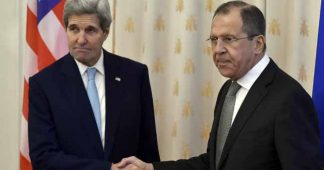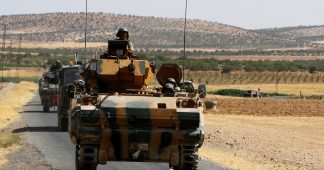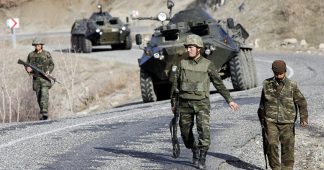Fighting rages on in Syria in wake of US-Russia brokered agreement
By Jordan Shilton
US Secretary of State John Kerry and his Russian counterpart Sergei Lavrov announced an agreement early Saturday morning on cooperation between Washington and Moscow in Syria’s five-year-old civil war.
The US and Russia have committed to a ceasefire beginning Monday at sunset, which is to last for a week over the Eid holiday. The US-backed rebel groups are supposed to cease attacking government-held areas, although it appears increasingly likely that some rebel groups will refuse to implement the deal. The Assad government has agreed to allow humanitarian supplies into Aleppo.
The deal is being presented as having the potential of bringing peace to the war-torn country. But the very suggestion that a deal crafted by Washington can serve to bring peace to Syria, a country that has seen around half a million deaths and a population decline of some 5 million due to a US-orchestrated war for regime change, is preposterous.
In reality, Washington has acceded to the agreement to give some respite to its proxy forces around Aleppo in particular, where government troops have made substantial gains over recent weeks. In addition, the hypocritical handwringing from the political and media establishment over the terrible conditions faced by the Syrian population caused by the war they played a central role in fomenting and promoting is a transparent attempt to create the conditions for more direct US and Western intervention under the pretext of human rights.
It remains questionable whether the ceasefire will come into force, let alone hold. The ink was barely dry on the agreement when upwards of 100 civilians were reportedly killed Saturday as fighting raged in and around Aleppo and Idlib. The Assad government was accused of conducting airstrikes on civilian areas, while opposition groups shelled residential areas in the government-controlled part of Aleppo, Damascus, Dara’a and Hama.
Moreover, it is little more than six months since the previous US and Russian ceasefire was brokered in February, only to unravel weeks later as Washington announced plans to send special forces to Syria as it intensified its five-year war for regime change.
Support for the deal within the US political establishment is by no means unanimous. The Guardian noted that significant forces in the Pentagon are reluctant to sanction any relaxation of the conflict in Syria due to the likelihood of a more aggressive President Clinton coming to office after November’s election. Clinton has already vowed to intervene more directly in Syria to achieve the overthrow of the Assad regime and the installation of a pro-western puppet government—the main concern of Washington from the outset of the conflict in 2011.
The other key provision of the agreement, which will see Russian and US aircraft cooperate in the targeting of Islamic State and other extremist groups like the al-Nusra Front, is no less problematic. Even reports in the bourgeois media acknowledge that Washington still has to convince so-called moderate groups to separate themselves from al-Nusra fighters, who have been systematically built up, financed and armed by the US to wage war on Assad.
US-aligned rebel groups in the Free Syrian Army denounced the deal in a letter to the US for defining the former al-Nusra Front, now known as Jabhat Ahrar al-Sham since it formally broke with al-Qaida, as a terrorist organization but leaving out Hezbollah fighters backed by Iran. The FSA has not formally announced that it will abide by the deal, although spokesmen were cited by Reuters yesterday saying they would. Others suggested intra-rebel clashes could break out, as some groups would remain aligned to the former al-Nusra fighters. This only underscores the fraudulent character of the incessant claims made by the US and the corporate media that Washington has been backing “moderate” rebels. The backbone of the Syrian opposition is in truth made up of Islamist extremist forces.
The verbal pledge of cooperation between Moscow and Washington has in no way reduced the tensions over Syria. While the US hopes to strengthen its dominance throughout the Middle East by removing Assad and installing a regime more pliant to its interests, the Kremlin intervened in the conflict to defend its main ally in the region and its sole military base outside of the former Soviet Union. The potential for a military conflagration between the nuclear-armed powers, which would quickly spiral out of control and provoke a broader war, remain very high. The increased presence of the European imperialist powers, such as Germany, which expanded its presence at the Incirlik air base in Turkey last week, and Britain, which is reportedly operating covertly within Syria, makes the situation even more explosive.
Pentagon spokesman Peter Cook gave some indication of this in his terse response to the Kerry-Lavrov deal. Openly questioning the readiness of Assad and Russia to hold up its end of the bargain, Cook stated, “Those commitments must be fully met before any potential military cooperation can occur. We will be watching closely the implementation of this understanding in the days ahead.”
Cook’s remarks are no mere idle threat, but demonstrate that the US military will seize on the slightest incident to renege on the deal and plunge the country into all-out war if it determines that this is the best way to secure Washington’s geostrategic interests against its rivals. They were made just days after Secretary of Defense Ashton Carter provocatively told a British audience that Moscow was trying to reshape the world order and in the context of a US presidential election campaign in which the Democrats are presenting themselves as the party most committed to upholding Washington’s interests around the globe by use of military force.
Critically, the agreement provides for the banning of the Syrian air force from areas in which the US and Russia have agreed to cooperate to target ISIS and other extremist groups. This lays the basis for direct clashes, staged or otherwise, between US and Syrian planes and could mark an important first step in the establishment of a no-fly zone. This could, in turn, rapidly involve the air forces of the other imperialist powers to enforce it.
The British government appeared equally unconvinced by the deal. Foreign secretary Boris Johnson made a barely veiled criticism of Russia in his statement on the agreement, urging “all parties to the Syria conflict and all countries with influence upon them to do what is needed to end violence and lift sieges.” He added, “They will be judged by their actions alone.”
The so-called peace deal will see no let-up in the Turkish incursion into the north of Syria, which Ankara sees as essential to dislodge the Kurdish fighters of the People’s Protection Units (YPG) so as to block the emergence of a Kurdish-controlled zone on its southern border. In fact, Turkish President Recep Tayyip Erdogan announced Sunday that the intervention would be expanded. The justification for this was his country’s “duty” to defeat ISIS, he claimed.
Ankara has made clear its intentions to carve out a substantial area of Syrian territory along its border, where it intends to confine refugees and some of the anti-Assad forces with which it is collaborating. Erdogan even suggested that Turkish troops could be used to supply aid to areas in the north of the country, including Aleppo. Should this take place, the deployment of troops from a NATO member deep into Syria could serve as the prelude to a wider intervention by the US-led military alliance.
Stepped-up efforts to exploit human rights to hasten the downfall of the Assad regime were already on display prior to Saturday’s agreement. TheNew York Times carried a prominent article on the decision of 73 Syrian aid organizations to break ties with the United Nations on the basis of allegations that UN operations in the country were cooperating too closely with Damascus. The groups, including many which openly back opposition forces, said they would no longer participate in the UN’s information-sharing system.
Kerry and others wasted no time in pressing for stepped-up efforts to remove Assad. “Today the United States and Russia are announcing a plan which we hope will reduce violence, reduce suffering and resume movement toward a negotiated peace and a transition in Syria…that, if followed, has the ability to provide a turning point, a moment of change,” he cynically declared after the agreement.
The European Union’s foreign policy representative, Federica Mogherini, spoke along similar lines, saying Saturday that the UN should prepare a “proposal for political transition, based on relevant UN Security Council Resolutions.”











